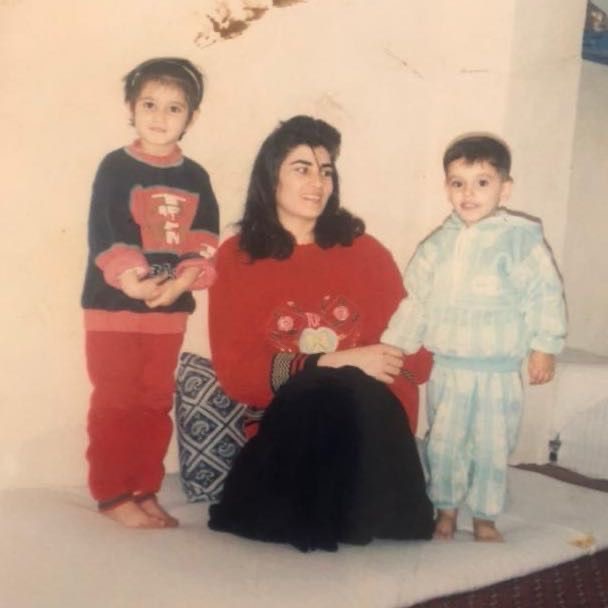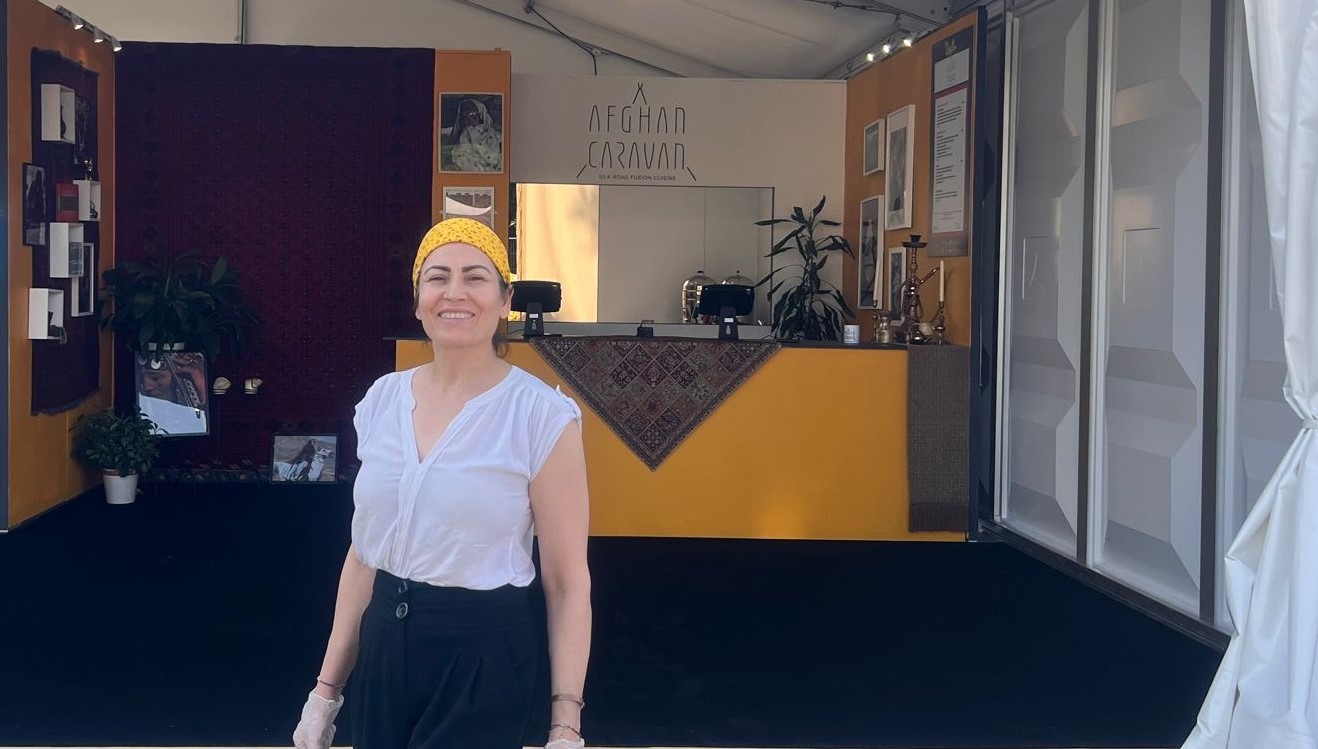Traditionally, women have done the cooking. Rarely, though, do they find themselves at the helm of a restaurant. Mariam Amini speaks to the Afghan women at the vanguard of culinary entrepreneurship.
Samim Bagshi shuffles from behind the counter at Watani Sheeryakh, churning a special milk mixture in a metal bucket by hand. Eventually, from this fragrant blend, the creamy curves of Afghan sheer yakh (ice cream) start to form. A generous splash of crushed almonds and pistachios sprinkle each serving.
Based in Ilford, east London, Bagshi’s wide grin adorns the storefront. He’s also the face of the brand online. It seems fitting; and yet, another character holds the reins at Watani: Marina Bagshi, the self-proclaimed brains behind this sibling-led business. The corner of her eyes crinkle as she watches her brother serve their award-winning sheer yakh.
The 27-year-old is one of five siblings, and the eldest daughter in her family. Born in the Netherlands to refugee Afghan parents, the family moved to the UK in 2005.
“I grew up with two older brothers,” says Marina. “So I often thought I was one of the boys. However, I was definitely treated differently because I was a girl. I was more babied because of my gender. It was always a safety concern. Chores would fall on me. I also couldn’t carry out certain responsibilities like helping my dad at work.”
Eventually, through regular debates and discussions with her parents, Marina was able to foster a more equal standing at home. One of many Asian female entrepreneurs whose small businesses celebrate their roots, she attributes her skills to her father, who came from a family of hospitality experts in Kabul.
“Over the years, I’ve seen him open and manage many businesses, and that’s really what inspired me to go on this journey. I always wanted to have my own business on the side.”

Marrying a passion for business with her love of Afghan food, Marina believes being a woman has also enriched her work ethic: “We are often underestimated, but I think women are more thoughtful when it comes to business. Men tend to overlook the finer details.
“For example, with Watani, I always try to go the extra mile to research ways in which we can connect with more people. People think women are better cooks because of what society has made us believe. However, my brother is way more passionate about the cooking side of our business.”
“She’s very creative and particular about her work,” says Samim, Marina’s brother. “If we have a project coming up, we feel confident knowing she’s gone over every small detail. We also have younger sisters, so seeing Marina in this role has shown them that women can have important roles in business too.”
“I was definitely treated differently because I was a girl. I was more babied because of my gender”
Marina Bagshi
Traditionally, women may have done the cooking. They certainly still do in many corners of the globe. But besides this, there is a growing craving to lead and be in charge: they need only the resources, opportunity, and a passion for food.
By paying homage to her lost heritage through the lens of food, business, and womanhood, Marina hopes to better serve Afghanistan as well as the diaspora. She’s not alone.
In recent years, more and more Asian women have embraced their entrepreneurial spirit: Vietnamese sisters Kim and Vanessa Pham, who co-created Omsom; Jing Gao, the Chinese chef behind the condiment company Fly By Jing; and third-generation Mumbai native Sana Javera Kadri of Diaspora Co.
It’s an appetite that transcends race. In the UK alone, over 150,000 female-led companies were launched in 2022. This is more than twice as many as in 2018.
Zulfia Abrahimi, head chef at Afghan Caravan, understands the craving for leadership. Having left Afghanistan with her husband and infant children in 1996, the family’s journey of refuge led them through Iran, Turkey, Greece, Italy, France, and eventually the UK.
“It is traditionally the women who build connections by cooking,” says Zulfia. “Delicious meals that hold onto culinary traditions get passed down between generations of females.”

She acknowledges the impact her professional role has had on her personal development: “I definitely think women should get more involved in business. I have gained so many skills – from communication to financial literacy. Not to forget the confidence it gives you as you navigate challenges.”
Zulfia also notes how being part of a ‘female-led business’ helps her team bond on a deeper level. “We approach the working environment with a deeper understanding of what we want to achieve and a familial compassion.”
The CEO behind Afghan Caravan is none other than Zulfia’s own daughter, Neelofar. Having only launched in April 2023, their Silk Road fusion cuisine has already gained recognition, with appearances at large-scale events such as the National Geographic Food Festival and the Taste of London Festival.
Neelofar also celebrates her femininity as a means for building resilience: “I love that we really experience our emotions. We see something, feel moved, and usually cry. I think it’s healthy and helps us bear more because we’re able to feel and express more.”
“Delicious meals that hold onto culinary traditions get passed down between generations of females”
Zulfia Abrahimi
For Zulfia, the main highlight is “seeing people’s faces light up when they try Afghan food for the first time and they become curious about our culinary traditions, which leads them to ask questions about Afghan culture”.
The pair are a testament to what can be achieved when different generations of women come together. Their successful venture demonstrates the power of food in fostering independence beyond the restaurant walls.
“By sourcing our saffron from Afghanistan, we’re also giving back to the rural communities who farm the saffron plant as a means of living,” says Neelofar.
Prior to starting Afghan Caravan, she was in the creative industries, so is used to high pressure environments. As for where she gets her drive, Neelofar credits her mother: “The food business is very challenging, especially when you’re new. I learned everything I know from my mum. I’m still learning from her.”
“Afghan food means home,” adds Zulfia. “It means I can always have a piece of home away from home. The kitchen is like the heart of a home and I keep that heart alive through my culinary practice and sharing meals with family and friends.”
